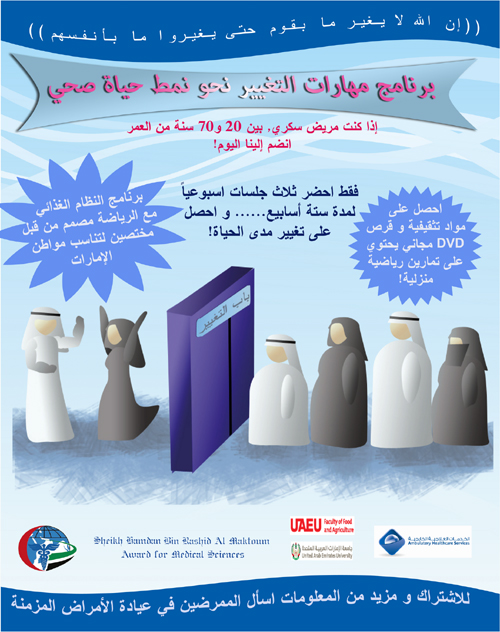Sheikh Hamdan Bin Rashid Medical Award studies the effectiveness of nutrition education in confronting to Diabetes in UAE
01 February 2012
Supported by Sheikh Hamdan Bin Rashid Al Maktoum Award for Medical Sciences, the first study of its kind in UAE is now being carried out on developing culturally-appropriate diabetes education programs that focus on diet and physical activity to control blood sugar levels in Emirati patients with type II diabetes.
This was announced by Dr. Habiba Ali, Assistant Professor, Department of Nutrition and Health, Faculty of Food and Agriculture, UAE University and the leader of the research team.
She said that the research sample includes 200 Emirati patients with type II Diabetes, aged between 20 and 70 years, attending Al Yahar, Muwaiji and Hilli health centers, affiliated to Ambulatory Health services (SEHA), Abou Dhabi Health Authority.
Referring to the importance of the research, Dr. Habiba said that according to the results of her previous scientific study in 2007 at UAE University in Al Ain, the majority of patients with Diabetes are not aware of kinds of food that may lead to increase levels of sugar in their blood.
For example, 93% believed that white bread, not brown bread, increase sugar levels in blood. Also, 88% believed, incorrectly, that the unsweetened fruit juice does not lead to increased levels of sugar in blood.
Dr Habiba said that developing knowledge and skills of Diabetics helps them to gain confidence and motivation to take an effective control over living with a chronic condition, in order to avoid the debilitating complications of Diabetes such as blindness, kidney failure and heart disease.
She added that “Skills for Change” diabetes education program is carried out through two main axes. The first one is developing a nutrition education program for Emirati patients with Diabetes, to be taught to around 40 doctors, nurses and dietitians at the study’s control health centers.
Currently, trained doctors, nurses and dietitians teach the program to patients attending those centres.
As for the second axis of the study, special classes for simple exercise, designed for Diabetics, are held. Also, video tapes, created by the team of the study using the Emirati accent, are given to the patients to keep on exercise at home, at least twice a week for six months.
Dr Habiba said that within several months the sample of patients will complete “Skills for Change” diabetes education program, reaching to the final phase of the study, the evaluation process.
During that phase, the patients will answer the questions of a certain questionnaire, on their acquainted information. Also, they will subject to a series of medical tests, measuring their ability to control their weight, blood glucose and blood lipids.
Dr Habiba said that the results of the study will be evaluated through comparing its results with further tests on Emirati Diabetics, who were not subjected to the program, attending 4 control health centers including Al Maqam, Al Mezyad, Zakher, and Niyadat, affiliated to Ambulatory Health services (SEHA), Abou Dhabi Health Authority. “In case of the program success, it will be applied in more health centers on Diabetics and patients with obesity and high blood lipids”, Dr. Habiba said.
“I invite the Emirati Diabetics to participate in the study, which is an attempt to address the diabetes state in UAE, the second state in terms of global prevalence of diabetes as recently declared by International Diabetes Federation”, Dr Habiba said.
On the other hand, Dr. Seham Al Dien Galadari, Chairman of the Scientific Committee of Sheikh Hamdan Bin Rashid Al Maktoum Award for Medical Sciences’ Research support Center said that supporting such studies is a part of the award’s tireless efforts in supporting scientific research within UAE.
“Such papers, contribute to a better understanding for the nature of UAE society, casting a shadow on UAE general policies aiming at meeting the requirements of patients and achieve the best results in diagnostic and therapeutic strategies”, Dr. Seham added.

